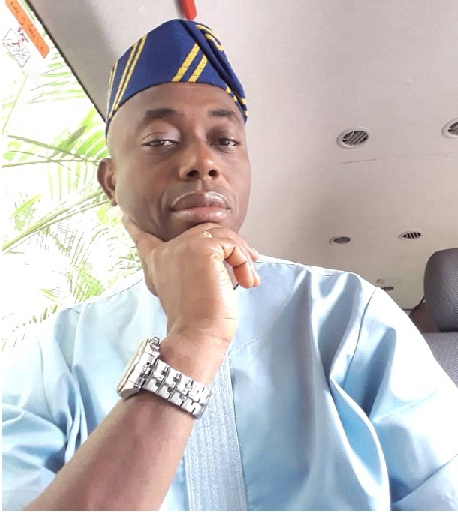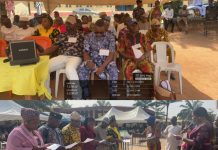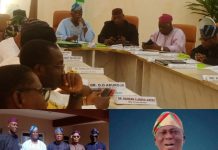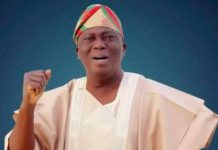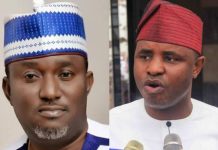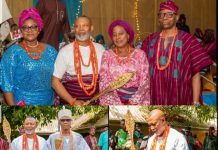
Being the Text of the 2022 Annual/End of the Year Lecture of the Forum of Heads of Federal Government Establishments and Institutions in Nigeria, Ondo State Chapter, Delivered by Prof. Busuyi Mekusi on Wednesday 7th December, 2022, at AFEN ADEBAYO Multipurpose Hall, Federal University of Technology, (FUTA) Akure, Ondo State.
Opening
The culture of public lecture is not uncommon to us as a people, only that details of engagements are not always mostly reflected in the subsequent attitudes of participants, and readers of the texts of the lecture, as the case may be. Notwithstanding this pessimism, however, I have an abiding belief in the axiom that it is only the person that eats that gets satisfied, beyond savouring the aroma of such a delicacy. To this end, whether this interaction produces the immediate desired ends or not, one could be certain that the addition of this effort to the gamut of discourses on national development stands the chance of being an elixir in the conversations to birth a new Nigeria.
On this note, I sincerely appreciate the planning committee, and by extension the Forum of Heads of Federal Government Establishments and Institutions in Nigeria, Ondo State Chapter, for the rare privilege to deliver the annual end of the year lecture for 2022. Even though it may appear redundant to issue a caveat, it may be important to appeal to us to be reasonable enough to tolerate any supposed overboard, as I have the urge and the predilection to say things as they are, as against the endemic prevarication that dictates our thoughts, guides our actions, and taint our perceptions, often times.
Introduction
Anecdotes and other oral narratives are very clear on the commitments of mammals to organise themselves, administer their environment and conquer their enemies. One of the vulnerable lots of these is the ant whose ways are always recommended to man through Biblical allusions. The tiny but not lazy ants gather their foods in summer and stay in their holes to evade torrents of rains that could sweep them away during the wet season. They have principal officers, from the King to the Queen, and other lieutenants that secure their holes against invasions, and meet the needs of the revered and vulnerable, as desirable. The organisational structure of ants and other social insects is said to be the ‘response threshold model’. Arguably, a threshold for a particular task is the amount of stimulus, such as a pheromone or interactions with other workers, necessary to motivate a worker to carry out a particular task.
Homo sapiens are built with innate capacity to sift, sort, aggregate and disaggregate notions, ideas and materials for the purpose of relating with others and their environments. This innate ability could nonetheless be perverted through conscious abandonment of available stimuli that nudge in positive directions. Beginning from the classical or pre-modern periods, man has been creatively organising himself, administer his environment, and govern his spatial-temporal order to attain specific intentions and score certain goals. These attempts from across the global space have produced the necessity for expansion, exploration and conquest, thereby igniting the combustive fire of globalisation. To this end, the different cross-border and racial exchanges overtimes have produced newer governance template, precipitated fresh challenges, and unveiled new possibilities cum prospects for integrated national, regional, continental and global developments.
Issues in Historical Perspective (Democracy and other Forms of Government)
The classical origin of democracy has been traced to ancient Greece, similar to the ascription of the origin of drama to her, emanating, according to Attahiru M. Jega (2007:3) “from the attempts in the Greek city-state of Athens to reform, organise and manage its political community (polis)”. Going further to re-echo the opinion of Dunn, 1993, Jega submits that “in a democracy, the people (the demos), its human members, decide what is to be done, and in so deciding they take their destiny firmly into their own hands”. In another vein, and analogous to the manifestation of an amorphous entity, some scholars, according to Leon P. Baradat (2012:69), have “argued that democracy is simply a way of making decisions”, with a group known as ‘the process democrats’ submitting “that democracy is nothing more than an agreement among citizens that the majority vote will carry the issue or that one branch of government will not reach too far into the functions of another branch”.
It is important that democracy has evolved over the years, with different variations across the world. However, forms of government globally include; military (dictatorship, authoritarianism and totalitarianism) monarchy, oligarchy, communism, and theocracy. Modern idea of democracy was said to have started with the interrogation of “the question of absolutism and the assumption of sovereign power of monarchs over their people and societies”, with a rebellion and movement led by Oliver Cromwell signalling “the atmosphere within which the notion of popular sovereignty and representative government flourished” (Jega, 2007:9).
Given Nigeria’s histories of internal conquests and external Arabic and British invasions and the attendant experiences, the theocratic regimes that was an offshoot of fiefdom diminished in relevance, and waned in authorities. Talking about democratisation process in Africa, Jega (2007:19) holds that “discourses on democracy in contemporary Africa are heavily influenced by the swift currents of globalisation and western triumphalism”, which have accompanied the cold war”. The Obas in the southwest, Obis in the southeast, Kings in the south south, and Emirs in the north are today prescribed by governmental authorities, installed and dethroned based largely on the wills and caprices of sub national authorities within the ambits of the laws governing chieftaincy matters. It is hoped that the quest for more constitutional powers for traditional rulers would push through, as the Sultan of Sokoto, and sometimes, the Ooni of Ife, continues to prick the conscience of political leaders towards doing what is right and desirable.
Activities preceding Nigeria’s independence had both the excitement of champions for independence with southern extraction and pessimists from the north who felt momentarily otherwise, that the time was not right for national political autonomy. The commencement of the British indirect rule in 1901 had structured Nigeria into two regions of south and north, with provinces, as the number increased to three. The British amalgamation of the southern and northern protectorates in 1914 is viewed by some as an error that aggregated strange bed fellows under same roof, with suspicions trailing distinctive lines and cultural markers. Nigeria was granted full independence in October 1960, as a federation of three regions (northern, western and eastern), backed by the Lyttelton constitution of 1954. Between 1960 and 1963, Nigeria was a sovereign state and independent constitutional monarchy.
The three regional governments in the first republic, presided over by Awolowo in the west, Azikiwe in the east and Ahmadu Bello in the north recorded remarkable feats, with the possibility of comparative stimulating growth in the different regions. In-between Nigeria political evolution, ethnic mistrust, nepotism and corruption crept into the interactions among the citizens, particularly the elites. Nigeria first became a republic in 1963, but was interrupted by a bloody coup d’état in 1966, heralding a military rule. An avant-garde separatist movement, led by Odumegwu Ojukwu, announced a break-away of the Republic of Biafra from Nigeria, leading to the outbreak of the Nigerian Civil War in 1967, which raged till 1970.
The military regimes of Johnson Aguiyi-Ironsi, Yakubu Gowon, Murtala Mohammed, Olusegun Obasanjo, Ibrahim Babangida, Sani Abacha, and Abdulsalam Abubakar witnessed various political instabilities, policy somersaults, corruption and transitions. Awolowo’s platitude that “the worst civilian rule is better than the best military dictatorship” was used copiously to discredit military rule and popularise democracy. One connecting rod between most of the military regimes was corruption, which also became foregrounded during the Sheu Shagari dispensation, sandwiched between the military dictatorships. If corruption was a frightening sore then, it has since become a ravaging cancer that has incinerated the entire Nigerian society. This is as President Buhari keeps warning the citizens that corruption will kill Nigerians if they fail to kill it.
PMB’s lamentation recently that governors, with executive criminal-legalising immunity, are stealing from local government council allocations reminds us of one of the official corruptions that we nurse by reason of Nigeria’s warped political federal structure, which subjects sub national governments to layers above them. The aborted efforts of the 9th Assembly to review the military-birthed 1999 Constitution signals how fundamentally faulty Nigeria foundational grundnorm is. At the eve of another transition to a new government in 2023, since after Nigeria returned to democracy in 1999, ethno-religious considerations are still bandied by politicians to sway prospective voters, just as systematic attacks and destruction are being visited on INEC facilities in the southeast and southwest, with INEC chairman, Mahmood, fingering politicians. Some watchers have described the arsons on INEC facilities as part of the climate of fear to be precipitated, to cause the postponement of the 2023 elections, thereby leading to an interregnum.
The agitations for restructuring, which some referred to as an ambivalent term, and the calls for true fiscal federalism are snippets that question the legitimacy of the present template of Nigeria nationality or nationhood. These terms being very touchy in meaning and application, the reference to Nigeria both as a state and a nation is as problematic as the attempts to justify the perceived inequalities and injustice that a negatively skewed structure is believed to have caused, to the advantage of the north (federal government), and disadvantage of the south (sub national entities). However, Leon P. Baradat (2012:47) is of the opinion that “the terms nation and state are often confused. Nation is a sociological term referring to a group of people who have a sense of union with one another. State is a political term that includes four elements: people, territory, government, and sovereignty”. Beyond the dismissive attitude of the federal government to the self determination struggles by IPOB and the Yoruba nation, one indisputable implication is that the legitimacy of existing sovereign entity called Nigeria is being questioned by some of its citizens, and their calls are not silly after all, if done in line with global best practices. One may, therefore, argue that Nigeria is still merely a state and not a nation.
Good Governance and Nigeria
Democracy is a pathway to good governance, as democratic indices help promote good governance. Good governance is “the political and institutional processes and outcomes that are necessary to achieve the goals of development…the degree to which it delivers on the promise of human rights: civil, cultural, economic, political and social right”. (see https://www.ohchr.org. Accessed 01/12/2022). Put differently, good governance relates to the gauging of how public institutions carry out their duties, and administer public resources in order to ensure the protection of human rights. In attaining the foregoing, the deployment of resources must be free of abuse and corruption, with substantial reliance on established ground rules.
Establishing a strong relationship between good governance and democratic consolidation, Jega (2007:142) listed the features of the former under a democratic dispensation to be “transparency and accountability of public officials, responsible conduct, as well as their responsiveness to the demands, needs and aspirations of the governed”. The various outlooks on good governance reinforce the need for people in charge of the resources of the state, or who preside over the commonwealth, to be fair, just, honest, and selfless in most apparent manner to be able to earn the respect and cooperation of the citizens. However, over the years, inadequate social amenities, collapsed infrastructure, privatised and commercialised education, insecurity, struggling economy and abject poverty, etc., blameable largely on endemic corruption among political office holders and public officials, including civil servants, are some of the indices that suggest lack of good governance in Nigeria.
This failed citizenship resulting from denial of social service is symptomatic of systematic emasculation of the led by the leaders, the latter that chose to promote poverty in the midst of plenty. One of the unbelievable contradictions about Nigeria is its inability to translate the huge earnings from crude oil to an impactful development of the country and her people. Whereas the Niger Delta that lays the ‘golden egg’ has been devastated by oil exploration, with emerging thieving leaders misappropriating what should be used to better the lots of the people, it is arguable that most Nigeria natural endowments have become mere liability, as a result of good governance. With the Niger Delta Amnesty programme producing elite billionaires, and former militant leaders securing oil-pipeline protection, in the face of humongous crude oil thefts, it is evident that Nigeria is a mere joke. Time will tell if the oil and gas discovered in Kolmani fields, beneficially located between Bauchi and Gombe and States, would not end up as another nightmare.
Taking a cue from Jega’s (2007:273) opinion that public policy is central to governance, and that “it is about using public resources by public functionaries so as to rationally, efficiently, and effectively meet the fundamental needs and aspirations of the people in the short-medium – and long-terms”, one could conclude that the continuous inability of government to make fuel available to the citizens, with moribund refineries that are recalibrated with huge expenditures in dollars without any positive result, and staff being paid for doing nothing, laced by continuous polemics about scandalous fuel subsidy payments in trillions, it is predictable that Nigeria is programmed to fail at the level of collective interest, with the prosperity of few corrupt individuals.
The culpability of some of us seated here, and our ilk elsewhere, is hinged on the centrifugal roles the public service plays in good governance. While establishing that Nigeria had a robust public service before the corruption and recklessness inscribed by the military, Jega (2007:274) listed some of the outcomes of the degeneration in the public service as “lack of professionalism, excessive partisanship, endemic corruption, slowness and inefficiency, and crass selfishness and greed”, even though he acknowledged the efforts of few of them that seek to reverse the trend.
Without any attempt to demean civil servants, their involvements in the businesses of government, from budgeting padding to procurement, from execution of projects to approval of payment, etc., at the various critical junctions of the chain automatically make it difficult for them to absolve themselves of graft in the processes of executing projects, and the attendant failure of such initiatives. Apart from obvious misappropriation, misapplication of funds, inflation of contracts, overpayment for services, under-utilisation of funds for the purpose of approval, insertion of fictitious names into the payroll, including names of children and wards still in school, and employment racketeering, etc., are some of the guilty methods civil servants used to undermine public services. Talking about external borrowing, ‘white elephant’ projects and corruption, Ngozi Okonjo-Iweala (2012:4) referenced “the Ajaokuta Steel Mills, where an investment of more than US$5 billion yielded no returns to the economy” and “a significant part of the resources disappeared into the hands of top-level and middle-level public officials and politicians, most of it ending up outside Nigeria, deposited in foreign bank accounts or used to buy or invest in foreign assets”. The heinous crimes committed by civil servants are manifested in their bogus larger-than-life lifestyles, as they apparently live far above their means. Cutting corners seem to be one of the dangerous unofficial civil service procedures that were imported into the system, starting from the military era.
Even though there were efforts in the past to reform the civil service, the latest effort presented by the Oronsaye Report might not provide the latitude for the desirable new breath, unless there is unanimity among all stakeholders that we have had enough blames, tired of the putrefaction of corruption, and committed to building a virile nation where public institutions, facilities and processes work, as against concentration on building individual estates, fat personal accounts, overseas mortgages, investments in tax haven, etc. Like the paradox of Ghanaian Chichidodo which hates excreta but likes maggots, Nigerians pretentiously hate poverty but perpetuate corruption. The undeniable involvement of civil servants in corrupt practices and vitiation of public services are patently inhered in the different civil servants that have been arrested and prosecuted for grafts in the past, being a representation of the very many that are freely enjoying their loots. Little wonder that the acting chairman of the Independent Corrupt Practices and Other Related Offences Commission (ICPC), Musa Abubakar who spoke through Nathan Bako, once blamed civil servants for the menace of corruption in the service.
Abubakar pointed out that the trading of blames between civil servants and political office holders were needless, accusing civil servants for cooperating with the stranger in the politician to corruptly apply public funds. He concluded that “every single act of corruption will involve one civil servant or the other…either by way of facilitating the act of corruption or by keeping quiet” (see The Cable. https://www.thecable.ng. Accessed 01/12/2022). The arrest of the former Accountant General of the Federation, Ahmed Idris, by The Economic and Financial Crimes Commission (EFCC) for his involvement in a N174 billion fraud did not just typify betrayal of trust at the highest level of responsibility to the nation, but Idris regrettably represents many others at the various levels of governance that rob the Peters of the public service to pay his own selfish Paul, including education managers in the Ivory Towers that should set the agenda for the nation’s development. It is not only Abuja that hosts the empty unused unrented mansions built with graft proceeds, such abandoned buildings are across the country, built to retain capital, while the poor are struggling with space to hide their heads from atrocious weather conditions.
Nigeria Challenged Development and Implications
The cumulative negative effects of corruption on Nigeria’s development are found in the death of public institutions, such as NITEL and NEPA, as well as dry pipes, collapsed roads, moribund railways, struggling public schools, etc. Whereas countries in other climes are fast moving productively in the 21st century, and expanding their capacities, Nigeria is still struggling with how to generate and distribute 5,000 megawatts of electricity for more than 200milion citizens. Companies that were established in the sixties and seventies largely started closing down in the eighties, and got evaporated in the nineties. In the turn of the century, Nigeria is shamefully importing virtually everything, including the naturally endowed crude oil, and by so doing expending very scarce foreign exchange earned on mere consumerism. Collapsed public schools, due largely to underfunding, threw up private ones, enhanced by the IMF and World Bank influenced liberalisation of education and reduced funding by government. Some parents steal public funds while others labour laboriously sending their children to private schools, and accessing overseas training today, as social status-making is also fuelling corruption.
The dollarization of Nigeria’s economy has depressed the naira, with the elite worsening the depreciation of the naira through their luxurious lifestyles. The battered Nigeria economy has thrown up 133 million poor Nigerians, as indicated in the last report of Nigeria Bureau of Statistic (NBS), in collaboration with other agencies, with 20 million out of school children. This corruption-induced poverty has fuelled insecurity, with hopeless disgruntled citizens, openly violated by the oppressive attitudes of the elites, becoming potential vanguards of rage. Apart from the creation of cells by ISWAP and Boko Haram who have menacingly ravaged states in the north, kidnapping has been reduced to a common trade in the south, with everybody configured a potential victim. The climate of fear created by insecurity is not only physically disruptive but psychopathically traumatising and devaluing. Everybody, including the corrupt elites, lives with their hearts in their mouths!
Given the lavish or extravagant behaviours of rich political office holders and civil servants, the old moral compass of the Nigerian society collapsed, with materialism used to benchmark success. The community people that should enforce moral codes got disillusioned by the systematic poverty imposed by the upper class, and also joined other members of the ‘revolting poor’, who popularised ‘the end justifies the means’ maxim. Some new generation of Nigerians in the south, schooled in the civilisation of the liberal west, have resorted to cutting corners by getting involved in internet scams, money rituals, kidnapping, organ harvesting business, drug trafficking, prostitution, and so on, to be able to socio-economically negotiate in the heavily materially commercialised milieu. Dogs now eat dogs!
In the face of economic depression, weak infrastructure, moral depravity, primitive material accumulation and insecurity, a new wave of emigration of Nigerians began, with professionals abandoning their jobs in critical sectors of the economy like education, banking, health, telecommunication, ICT, etc. for greener pastures in Europe and America. Britain appears to be the greatest gainer of these forced migrants whose departures would negatively impinge Nigeria GDP. Nigeria hospitals are virtually empty due to the relocation of health workers abroad. This unfortunate development was confirmed during the press conference addressed recently by the Chief Medical Director of University College Hospital (UCH), Ibadan, when he disclosed that about 661 clinical staff resigned from the employment of the institution within 2 years. Poor access to healthcare is not just symptomatic of a failed state but is a pointer to high mortality rate and compromised life expectancy. It is only an unserious developing nation that would drain her best brains to developed nations. The question is: what exactly should we live for?
As a result of the multifarious challenges confronting Nigeria, and the inability of governments to provide acceptable public services, some watchers have described the country as a failed state. Although government keeps dismissing the variables used in tagging Nigeria a failed state, realities on ground point more to that direction. Looking at scholarly perceptions on the indices that make a failed state, Abdul-Ganiyu Garba (2003:I) posits that:
the failure of states is indicated by the collapse of central administration…or the more common failure to guarantee rights to ‘Life, Liberty, and the Pursuit of Happiness’ to a majority of citizens”.
To this end, Garba continues that:
when a State fails, economic or social conditions cannot be progressive. This is because insecurity to life and property, uncertainties, high transaction costs, distorted or perverse incentive systems and unequal opportunities observed in failed States aggravate and are aggravated by dysfunctional economic and social processes.
If the foregoing opinion of Garba is anything to go by, the present conditions in Nigeria that signpost precarious living, abridged rights, palpable poverty-induced hopelessness, economic downturn, galloping inflation, massive destruction of property and reckless killings by terrorists, inappropriate reward systems by reason of special salary payments in some government agencies, nepotism, compensatory appointments and posting, disproportionate application of federal character provisions, lack of access to basic infrastructure and amenities, etc., are suggestive of the rating that the country would attract.
While it is true that the PMB administration is making efforts in the areas of infrastructural provisions, the pictures across Nigeria show that critical roads have collapsed, fuel distribution is problematic, public universities are convulsing, even as poverty is ravaging the majority, one is not surprised that the country earned the sobriquets of a ‘shit hole’ and poverty capital of the world. The blame apportioned to state governors by President Buhari, whose government emplaced some social intervention programmes that are not verifiably effective, for the massive number of multidimensionally poor Nigerians recently made public by NBS, is a confirmation that more would still need to be done to reverse the present abysmal condition of common Nigerians.
The Roles of Public and Civil Servants
As the socio-economic pictures of Nigeria remain substantially blurry, the civil service (and servants) must recognise the major place it occupies in the scheme of Nigeria development, in order to build the needed synergy with other players in ensuring the development that Nigeria urgently needs. To achieve this, relevant knowledge and skills should be available to personnel whose recruitment should follow due process and assurance of competence, rather than the fickle approaches used for employment, which has been substantially through the backdoor. Compensatory employment and redeployment for patronage would hurt the system, throw up mediocrity, and overshadow the glimpses that should ordinarily help to illuminate the future. Ngozi Okonjo-Iweala (2012:51) had described the civil service at a time as “oversized, poorly skilled, and poorly remunerated”, resulting in “abysmally poor delivery of services to the public”. This is as she decried the abuse of the constitutionally-backed Federal Character Principle, in her opinion supported by civil servants themselves, as “grossly abused, with merit often sacrificed to mediocrity as patently less qualified people get appointed to posts in the name of fulfilling the principle” (52).
Public officers and civil servants in Nigeria should be similarly guided by the counsels of Jega (2007:281) that they should renew their faith in the oneness of Nigeria, and accelerate their commitment to its survival, wellness and development, recognising her diversity and complexity. Stressing further the need for civil servants to recognise their required contribution for the growth of Nigeria political economy, Jega opines that “they have to imbibe the good values requisite for national policy making and execution, backed by professionalism and competence…an obligation to be selfless, to eschew corruption, and to promote transparency and accountability in all their conduct, but especially in their official and public outing”. Without any attempt to scapegoat civil servants, a new reputation that neutralises the old notorious one would send appropriate signals, with reverberating positive effects, on the need for national rebirth.
Conclusions and Suggestions
Undoubtedly, the time to start the journey of a realistically new Nigeria can never be too late. Whether it sounds good or not, to have good governance in Nigeria, there is the need to restructure the over-centralised political system, with devolution of powers to the sub-national levels that must be made responsive and responsible. The emasculation of local governments by state governors continues, with largely hitherto irresponsible leadership at the local government level, to widen the gap between the far-removed capital in Abuja, and the remote-fringes in villages, where social service deprivation is localised.
Reminiscently, and beyond the reforms that were done in the past, which did not sufficiently address the problems in the civil service, like the civil service reform measures touted by Ngozi Okonjo-Iweala (2012:31), new initiatives, as contained in the Oronsaye Report, should be taken to creatively, effectively and productively reform the civil service. As this cluster of the Nigeria people receives attention, corresponding speed should be deployed for national rebirth. This is because, beyond the sophistry of government to get citizens to do things differently, for instance Akeredolu’s ‘think anew and act anew’, Nigerians must be unanimous on the need to set a new template for the nation’s development. This movement for a new better Nigeria is best driven by public officers and civil servants, given the fact that the disgruntled followership in the country is simply responding to the unacceptable behaviours of the leaders. We must note that the head is important to what happens to the body!
As we acknowledge pockets of Nigerians that have distinguished themselves in the public and civil service, there is the need for such people to be able to reproduce themselves in such a manner that they would become positive human agencies in the intended national reengineering, with remarkable influence on citizens within their spheres of operations. Given the limits of individual heroism, Nigeria government must refocus its efforts at taming corruption and promoting good governance to building institutions. While quality personality is important in service delivery, emplacing sustainable platforms for governmental functionality would help prevent abuses when people with questionable characters are at the helms of affairs.
Furthermore, considering the multi-layered negative impacts of insecurity on infrastructures, life and property of citizens, the ongoing fight against terrorists and bandits should be comprehensively recalibrated, with the de-ethnicisation and de-politicisation of the activities of non-state actors that get embolden by the day. To ensure a systematic fight against insecurity and corruption, Nigeria must come up with scientifically-based data reservoir for citizenship and property ownership. The foregoing is one way to check the porosity of the country’s borders. The forests that have since become havens for criminals must be recovered and put to economically productive ventures. In another vein, considering the importance of quality infrastructure to the lives of the people, the rebuilding of the almost comatose social facilities in the country must be achieved through private sector participation, instead of the continuous incurring of humongous foreign loans that are simply liabilities for the future.
There is no gainsaying the fact that expensive governance structure imposes tremendous financial burdens on Nigeria scarce resources. This is as leakages in revenue generation to government coffers deny the country of sizeable fractions of the resources required for good governance and service delivery. The continuous stealing of the crude oil that is the monolithic source for foreign earnings for Nigeria, the issuance of the contract for the protection of pipelines to private individual and the persistent rages ongoing in the southeast are clear indications that state actors are not on top of the challenges confronting the country. It is also true that postcolonial leaders in Nigeria, according to Jega (2007:121), are driven by “greed, selfishness, parochialism, pettiness and irresponsible conduct”, with “self-serving objectives in the power game and in the process of accumulation” which they tend to conflate with “ethno-religious or regional group agenda”.
Mistrust between leaders and followers, as well as suspicions between ethnic groups, should be substantially reduced, with justice and fairness, being critical elements for integrative social relations, promoted in government activities to eliminate the various claims of marginalisation, and agitations for self-determination coming from some quarters. In the larger discussion of theory of ‘justice as fairness’, Rawls and Dworkin are said to believe “that the basic structure of society should be publicly justified to all citizens”, which John C. Harsanyi, quoting Rawls, calls “the ‘first virtue’ of social institutions” (Collin Farrally, 2004: 7 & 22). You will agree with me that governments in Nigeria are elusive and snobbish, with passive citizens that are constantly physically, economically and psychically violated.
As we interface now and again, we must remember that if there is no Nigeria, there will not be the people, including you and me. We should also be reminded that we can start the fire that would generate the conflagration required to consume all elements militating against our development and vitiating our soundness of mind!
Talking specifically to members of this forum, I like to charge that the umbrella Forum of Heads of Federal Government Establishments and Institutions in Nigeria should be used as a veritable platform for national regeneration. The Forum should drive transparency in public service delivery, purge its rank and file in public service of untoward characteristics, ensure effective political participation, and be reliable representatives in government, if given the opportunity to serve. Ayi Kwei Armah might be right that “the beautyful ones are not yet born”, but we can immediately start the remodelling and beautification of the ugly and fairly beautiful. The time to act is now!
Thank you for your time!


